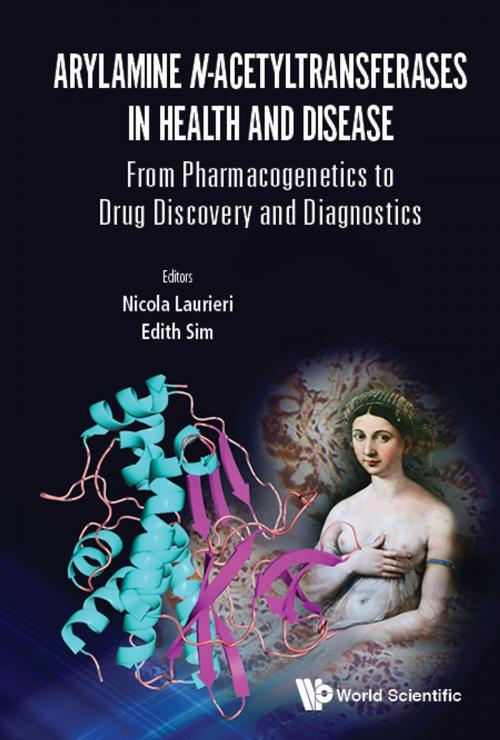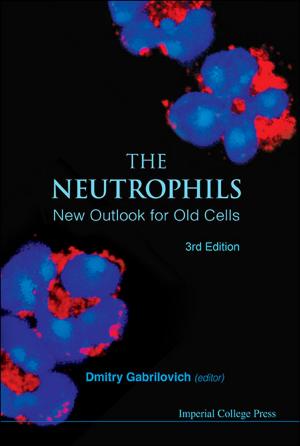Arylamine N-acetyltransferases in Health and Disease
From Pharmacogenetics to Drug Discovery and Diagnostics
Nonfiction, Health & Well Being, Medical, Medical Science, Pharmacology, Science & Nature, Science, Biological Sciences, Genetics| Author: | Nicola Laurieri, Edith Sim | ISBN: | 9789813232020 |
| Publisher: | World Scientific Publishing Company | Publication: | April 6, 2018 |
| Imprint: | WSPC | Language: | English |
| Author: | Nicola Laurieri, Edith Sim |
| ISBN: | 9789813232020 |
| Publisher: | World Scientific Publishing Company |
| Publication: | April 6, 2018 |
| Imprint: | WSPC |
| Language: | English |
This book is a fascinating overview of one of the first pharmacogenetic traits to be identified as responsible for genetic variation in response to drugs — the understanding of the arylamine N-acetyltransferases (NATs) is linked to many important therapeutic areas, particularly tuberculosis and also cancer. NATs have been important in the metabolism of established anti-tubercular drugs and also in carcinogenesis and susceptibility to bladder cancer. The reach of these enzymes spans pharmacology and therapeutics as well as toxicology and pharmacogenetics. The NAT genes are encoded in a highly polymorphic region of the human genome which has been explored for fine mapping in molecular anthropological studies.
The book takes a wide ranging approach covering all aspects of the arylamine N-acetyltransferases from genetics to the chemistry and structural biology of the enzymes in the organisms in which they are found, from humans to bacteria and fungi where they appear to have distinct roles. The coverage is by experts in the field from across the globe.
Contents:
- Human Arylamine N-acetyltransferases (NATs)
- Drug Metabolism & Pharmacogenetics Then and Now
- Human NAT2: Phenotypic Correlation with Genotype, Clinical Perspective
- Human NAT2: Genomics for NAT2 Polymorphisms
- Human NAT1
- NAT in Ontogeny
- NATs in Tissues
- NATs in Anthropology
- NATs in Other Eukaryotic Organism
- NATs in Primates and in Evolution
- Transgenic Animals
- Fungal NATs
- NATs in Prokaryotic Organisms
- Bacterial NATs
- Mycobacterial NATs
- NAT and Diseases
- Human NAT2 in Cancer Prediction
- Human NAT1 and Breast Cancer
- Mycobacterial NATs and Tuberculosis
- NAT Nomenclature
Readership: Biotechnology & pharmaceutical industry professionals, graduate students and researchers in cell biology, biochemistry and genetics; clinicians; senior undergraduates in cell biology, biochemistry and genetics; toxicologists, pharmacologists and those with an interest in drug and xenobiotic metabolism; evolutionary biologists and genetic anthropologists.
Key Features:
- The book features all of the key figures in the field of the arylamine N-acetyltransferases and includes scientists from Australia, Canada, France, Germany, Greece, Italy, Jordan, Spain, Switzerland, the United Kingdom, and the United States
- The treatment including human isoenzymes and also the NAT enzymes from other organisms makes a unique contribution. The coverage is from basic chemistry in identifying NAT substrates and inhibitors to anthropological studies of pharmacogenetics and also studies on fungi where the possibilities for commercial exploitation of these enzymes are ripe for investigation
- Each chapter is designed to be stand alone as well as fitting into an overall framework
This book is a fascinating overview of one of the first pharmacogenetic traits to be identified as responsible for genetic variation in response to drugs — the understanding of the arylamine N-acetyltransferases (NATs) is linked to many important therapeutic areas, particularly tuberculosis and also cancer. NATs have been important in the metabolism of established anti-tubercular drugs and also in carcinogenesis and susceptibility to bladder cancer. The reach of these enzymes spans pharmacology and therapeutics as well as toxicology and pharmacogenetics. The NAT genes are encoded in a highly polymorphic region of the human genome which has been explored for fine mapping in molecular anthropological studies.
The book takes a wide ranging approach covering all aspects of the arylamine N-acetyltransferases from genetics to the chemistry and structural biology of the enzymes in the organisms in which they are found, from humans to bacteria and fungi where they appear to have distinct roles. The coverage is by experts in the field from across the globe.
Contents:
- Human Arylamine N-acetyltransferases (NATs)
- Drug Metabolism & Pharmacogenetics Then and Now
- Human NAT2: Phenotypic Correlation with Genotype, Clinical Perspective
- Human NAT2: Genomics for NAT2 Polymorphisms
- Human NAT1
- NAT in Ontogeny
- NATs in Tissues
- NATs in Anthropology
- NATs in Other Eukaryotic Organism
- NATs in Primates and in Evolution
- Transgenic Animals
- Fungal NATs
- NATs in Prokaryotic Organisms
- Bacterial NATs
- Mycobacterial NATs
- NAT and Diseases
- Human NAT2 in Cancer Prediction
- Human NAT1 and Breast Cancer
- Mycobacterial NATs and Tuberculosis
- NAT Nomenclature
Readership: Biotechnology & pharmaceutical industry professionals, graduate students and researchers in cell biology, biochemistry and genetics; clinicians; senior undergraduates in cell biology, biochemistry and genetics; toxicologists, pharmacologists and those with an interest in drug and xenobiotic metabolism; evolutionary biologists and genetic anthropologists.
Key Features:
- The book features all of the key figures in the field of the arylamine N-acetyltransferases and includes scientists from Australia, Canada, France, Germany, Greece, Italy, Jordan, Spain, Switzerland, the United Kingdom, and the United States
- The treatment including human isoenzymes and also the NAT enzymes from other organisms makes a unique contribution. The coverage is from basic chemistry in identifying NAT substrates and inhibitors to anthropological studies of pharmacogenetics and also studies on fungi where the possibilities for commercial exploitation of these enzymes are ripe for investigation
- Each chapter is designed to be stand alone as well as fitting into an overall framework















